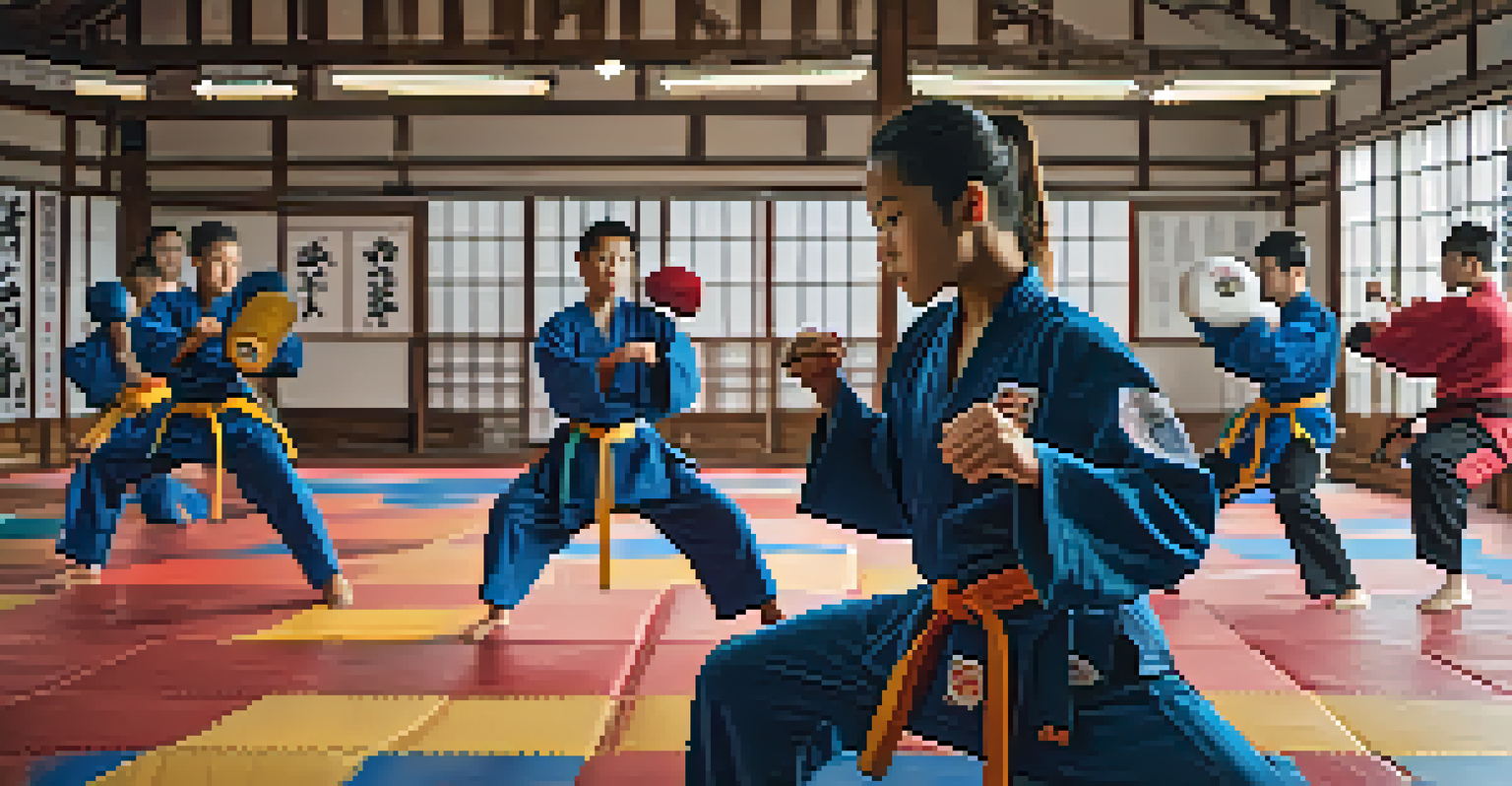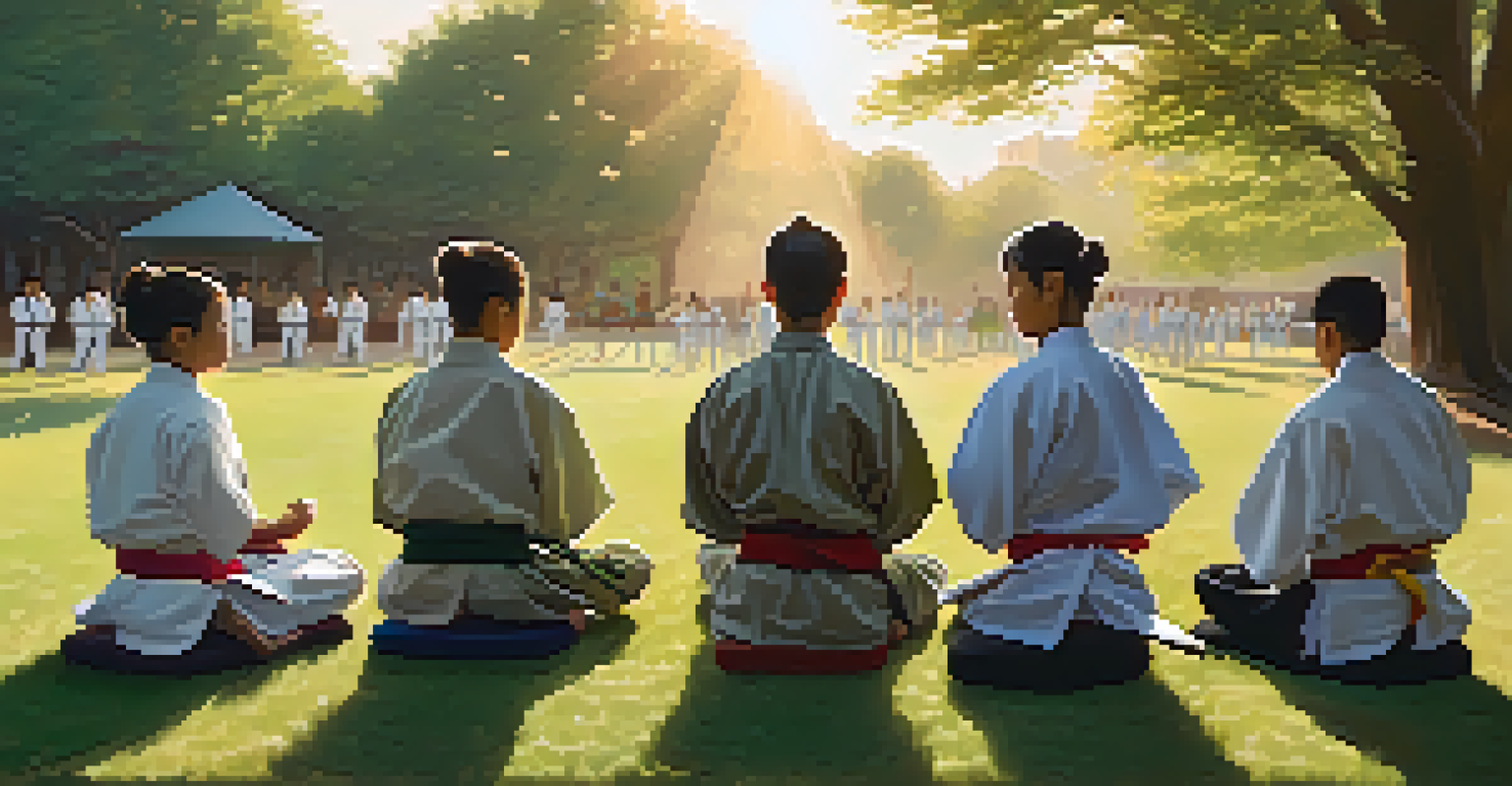Empowerment Through Martial Arts: Strengthening Mental Health

The Connection Between Martial Arts and Mental Health
Martial arts are often seen as a way to learn self-defense, but their benefits extend far beyond physical skills. Engaging in martial arts can significantly improve mental health by fostering resilience and self-discipline. This practice encourages individuals to face challenges head-on, leading to a greater sense of control over their lives.
Martial arts is not about fighting; it's about building character.
The routines and techniques involved in martial arts require focus and concentration, which can help distract from everyday stressors and anxiety. By immersing oneself in the movements and mental techniques, practitioners find a form of meditation in motion. This mental engagement not only calms the mind but also enhances overall cognitive function.
Furthermore, martial arts communities often provide a supportive environment where individuals can share their experiences and connect with others. This sense of belonging and camaraderie can alleviate feelings of isolation, making the journey towards mental wellness feel much more attainable.
Boosting Confidence and Self-Esteem Through Training
One of the most profound effects of martial arts is the boost in self-esteem and confidence individuals gain from training. As practitioners progress through various belts and techniques, they experience a tangible sense of achievement that can translate into other areas of their lives. This newfound confidence can empower individuals to tackle challenges they previously found daunting.

Moreover, martial arts training often involves setting and achieving goals, whether it's mastering a new technique or preparing for a competition. Each accomplishment, no matter how small, reinforces the belief that one can succeed with effort and persistence. This mindset shift is crucial for mental well-being, as it encourages a growth-oriented perspective.
Martial Arts Boosts Mental Health
Practicing martial arts enhances mental well-being by fostering resilience, focus, and community support.
Additionally, the physical aspect of martial arts cannot be overlooked. Engaging in regular physical activity releases endorphins, often referred to as 'feel-good' hormones, which naturally enhance mood and promote a positive outlook. The combination of physical fitness and personal growth creates a powerful cycle of empowerment.
Stress Relief and Emotional Regulation Benefits
Martial arts training serves as an excellent outlet for stress relief. The physical exertion involved in practice helps to release built-up tension and anxiety, allowing individuals to feel more relaxed and centered. Techniques such as controlled breathing and mindful movements also play a significant role in promoting emotional regulation.
The ultimate aim of martial arts is not having to use them.
Learning to control one’s body and mind through martial arts translates into better emotional management off the mat. Practitioners often become more adept at handling stressful situations, reducing the likelihood of emotional outbursts or feelings of overwhelm. This improved emotional intelligence fosters healthier relationships and better coping strategies.
Moreover, many martial arts classes include discussions on mental fortitude and the importance of mindfulness. This holistic approach not only teaches skills for physical confrontations but also emphasizes the importance of mental strength during life's challenges. As students embrace these lessons, they find themselves better equipped to navigate everyday stressors.
Building Discipline and Focus Through Practice
Discipline and focus are two core principles taught in martial arts that have far-reaching implications for mental health. The structured environment of martial arts classes encourages students to develop a routine, instilling habits of commitment and perseverance. This discipline often spills over into other aspects of life, enhancing productivity and personal responsibility.
Through rigorous practice, martial artists learn the importance of patience and consistency. Mastery of techniques takes time, and the process teaches students to stay dedicated even when progress seems slow. This ability to persist amid challenges fosters resilience, a crucial trait for maintaining mental health.
Confidence Through Training
Progressing in martial arts boosts self-esteem and empowers individuals to tackle challenges in various aspects of life.
Additionally, the focus required during training sessions helps sharpen concentration skills. Practitioners learn to tune out distractions and center their attention on the task at hand. This enhanced focus not only benefits martial arts practice but also aids in academic and professional settings, contributing to overall mental wellness.
Finding Community and Support in Martial Arts
Joining a martial arts class opens the door to a community of like-minded individuals who share similar goals and challenges. This sense of belonging can be incredibly beneficial for mental health, as it provides a support system during tough times. Many practitioners find that the friendships they build in class extend beyond the dojo, creating a network of support.
In martial arts, students often cheer for one another during sparring sessions or competitions, fostering a culture of encouragement and camaraderie. This supportive atmosphere can help combat feelings of loneliness and isolation, which are common in today’s fast-paced world. The encouragement from peers can significantly uplift one's spirits.
Moreover, sharing experiences and stories within the community can help individuals realize they are not alone in their struggles. Hearing how others have overcome similar challenges can be both inspiring and motivating. This collective journey towards self-improvement creates a powerful bond that enhances mental resilience.
Mindfulness and Mental Clarity Through Martial Arts
Martial arts training inherently promotes mindfulness, as practitioners must be present and aware of their surroundings. The focus on breathing, movement, and reaction creates a meditative state that enhances mental clarity. This practice of being 'in the moment' can significantly reduce anxiety and improve overall mental health.
As individuals learn to harness this mindfulness, they often find it easier to manage their thoughts and emotions outside of the dojo. This heightened awareness can lead to better decision-making and a more balanced perspective on life’s challenges. Practitioners report feeling less overwhelmed and more equipped to handle stressors.
Mindfulness and Emotional Control
Martial arts instills mindfulness, helping practitioners manage stress and emotions more effectively both on and off the mat.
Incorporating mindfulness techniques into daily routines can further enhance these benefits. Simple practices like focused breathing or visualization techniques learned in martial arts can be applied in various situations, fostering a sense of calm and clarity throughout the day. This integration of mindfulness into life bolsters mental well-being.
Empowerment: A Lifelong Journey Through Martial Arts
The journey of empowerment through martial arts is a lifelong commitment to personal growth and mental health. As practitioners evolve, they learn to embrace challenges, face fears, and celebrate victories—big and small. This ongoing process cultivates a strong sense of self-worth and resilience that can withstand life's ups and downs.
Moreover, martial arts encourages individuals to give back to their communities, often through teaching or mentoring. Sharing knowledge and experiences not only reinforces their own skills but also empowers others on their journeys. This cycle of empowerment enriches both the giver and the receiver.

Ultimately, the lessons learned through martial arts extend far beyond the dojo. The principles of discipline, focus, and resilience become integral parts of everyday life, enabling individuals to navigate the world with confidence and poise. This empowerment through martial arts creates a ripple effect that positively influences mental health for years to come.